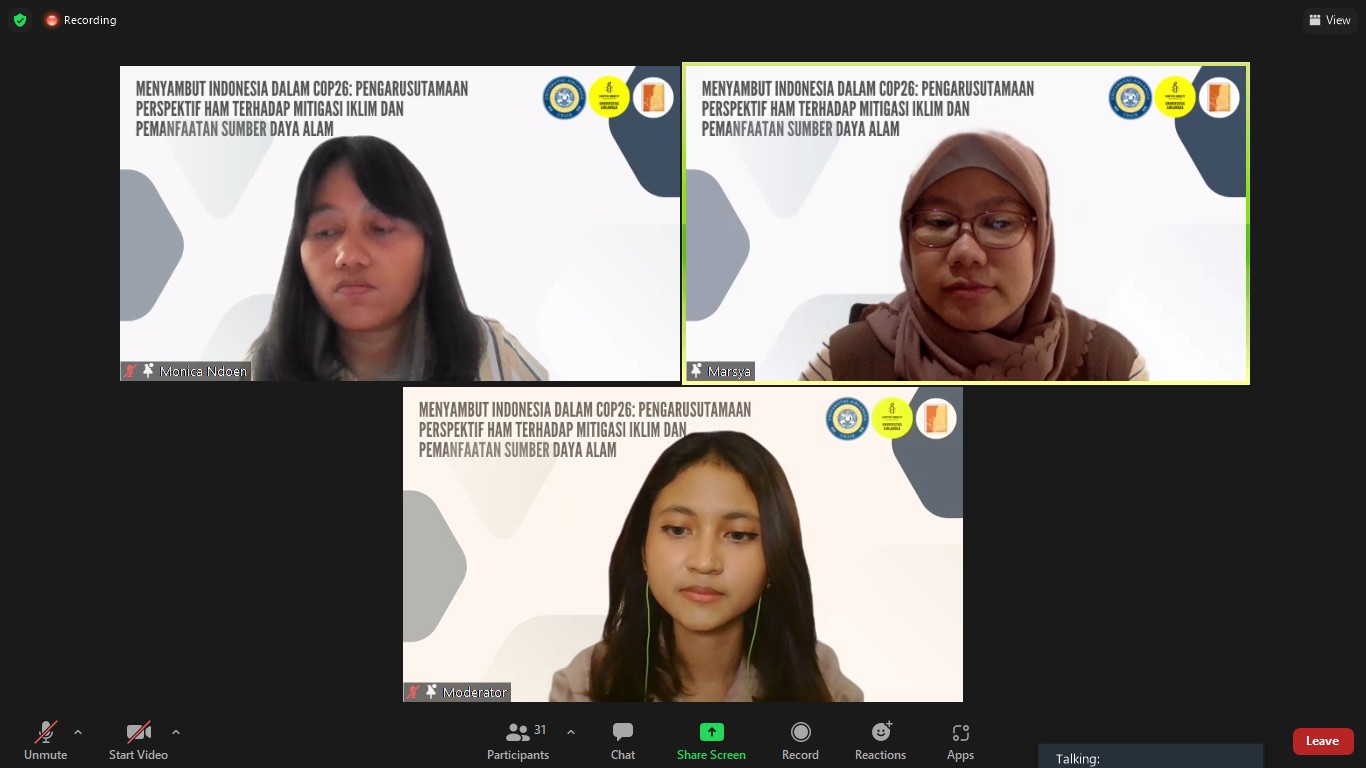UNAIR NEWS – On Saturday, October 23, 2021, Environmental Rights Study Committee of Amnesty International Indonesia Chapter UNAIR held a webinar entitled “Welcoming Indonesia in COP26: Mainstreaming Human Rights Perspectives on Climate Mitigation and Utilization of Natural Resources.” This event was conceived to welcome Indonesia’s participation in the 26th United Nations Climate Change Conference in Glasgow in early November 2021 and to evaluate Indonesia’s progress in carrying out its obligations to respond to the dangers of the climate crisis from a human rights perspective.
Special Staff of the Secretary General of the Indigenous Peoples’ Alliance of the Archipelago (AMAN), Monica Ndoen, was present as the first speaker. She said that indigenous peoples have a central role in suppressing climate change given that customary areas and forests store a lot of carbon and are very rich in biodiversity. In fact, President Joko Widodo has recognized the crucial role of indigenous peoples at the last COP21.
“But reality says otherwise. The Indonesian legal system that ignores the perspective of indigenous peoples makes the recognition of customary areas very minimal. Only 56 thousand hectares are recognized out of 12.7 million hectares, according to AMAN data. Indigenous peoples also often encounter repression and criminalization in protecting their rights and territories. There were about 40 cases of criminalization, based on last year’s data,” said the alumnus of Universitas Tanjungpura.
Furthermore, Researcher of Indonesian Center for Environmental Law, Marsya Handayani, became the second speaker. Marsya said that human rights and sustainability are interdependent, and climate change management would be much worse in a country that has a track record of poor human rights management. According to her, this is the point of urgency where the human rights perspective must be mainstreamed in handling the climate crisis because its impact has consequences for human rights violations in all aspects. For example, they may include the right to life, the right to a decent living, the right to a good and healthy environment, and the right to health.
“Mitigation measures must indeed be carried out on a massive scale in order to maintain global temperatures in the range of 1.5°C as mandated in the Paris Agreement. Minimization or even eradication of coal use and use of PLTU, transition to clean energy, and reformation of the agricultural and forest protection sectors are some examples of the steps,” said the Environmental Law expert.
The last presentation was brought by the third speaker, Manager of Climate Justice Campaign of WALHI National, Yuyun Harmono. He introduced the concept of climate justice, which views the climate crisis as a humanitarian problem that threatens human rights. Yuyun emphasized the fact that this perspective is rarely mainstreamed is beyond logic. Moreover, full of corporate interests destroy the environment. However, after UNGA acknowledged that the right to a good and healthy environment is part of human rights in October 2021, according to him, this is a progressive step.
“It is harmful to view climate crisis mitigation from a market perspective because the orientation remains to maximize profit such as carbon trading and the carbon market. We call it greenwashing. In fact, the problem of the climate crisis is a human rights problem, where all elements of civil society and the government must play an active role to overcome it progressively. Therefore, it is also very crucial to mainstream the issue of climate change from a human rights perspective into the political realm in Indonesia. Civil society organizations must also have a strong position to encourage the government and widen their perspectives regarding the actors causing the climate crisis,” concluded Yuyun.
Author: Pradnya Wicaksana
Editor: Nuri Hermawan





